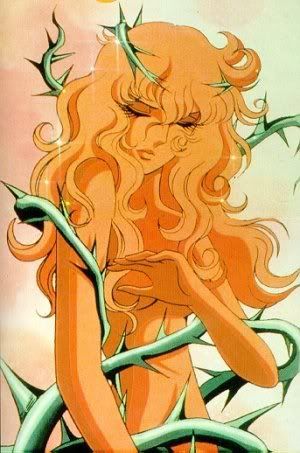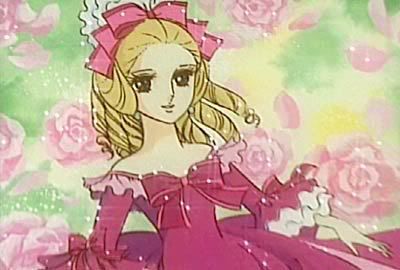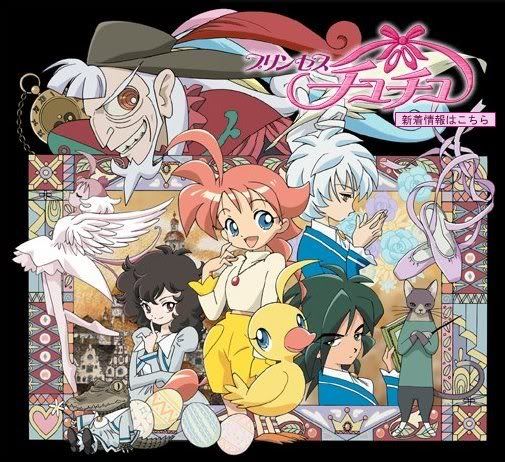gather round all you children who love stories....
During the winter when I can’t exercise outside I watch DVD’s of television shows and anime while I work out inside. I find things like the fixed scene length (for the purpose of commercials) and the repetition of the theme song and closing credits very reassuring.
So far this year since I put my bike away in November I’ve worked my way through two cancelled American network television series-- Twin Peaks (both seasons) and Birds of Prey (a 2002 WB adaptation of the DC comic book that only aired for 13 episodes)-as well as the Japanese animated series The Rose of Versailles (aka Lady Oscar) and am currently about halfway through Princess Tutu.

I’ve been interested in The Rose of Versailles since I was a high school student in the 1980’s and saw an excerpt from the manga. It tells the story of Oscar, a girl raised as a boy who at fourteen becomes head of an equally young Marie Antoinette’s royal guard. The series follows Oscar and Antoinette as they negotiate the duplicity of the court of Versailles and come into their own as women. Through very different, each comes to admire the other for both her integrity and spirit and they form a friendship that endures until the tides of history take them in opposite directions.
The Rose of Versailles is a fascinating cross-cultural document, a chronicle of the French Revolution as seen through the eyes of Japanese creators. To my eyes, it seemed that the idea of honor and inherent nobility both played a strong role in the narrative. The series villainesses-- Madame du Barry and Jeanne Valois-are self made women who have risen in the world by their own wits, wiles and ruthlessness whereas the heroines Oscar and Antoinette are of noble birth. At first Jeanne’s sister Rosalie, a lovely and good-hearted peasant girl seems to be the exception to this rule but it turns out that she too is of noble blood. The poor people of Paris have their moment of glory as dictated by history, but overall Rose of Versailles seemed much more sympathetic towards the nobility than anything I’ve encountered in Western popular culture with the exception of Sofia Coppola’s very understanding portrait of the queen in Marie Antoinette.
Does this leaning towards the court and the aristocracy have to do with Japan’s traditional and imperialistic culture or is it the result of unconscious decisions made by the writers to move the story along? After all, The Rose of Versailles is a high melodrama full of intrigue and swashbuckling adventure. Maybe telling the story in that manner means you have to have St. Just running around in a Phantom of the Opera mask swinging from ropes and assassinating nobles.
Because Oscar is a woman who dresses and lives as a man there is all manner of interesting lesbian subtext going on. Many of the women of the court are attracted to Oscar and her devotion to Antoinette seems very romantic and Rosalie is in love with Oscar at one point. I have to admit I was a bit disappointed that in the end everyone seemed to find their way into heterosexual relationships. Marie Antionette has a passionate and ill-fated love affair with Count Axel Von Fersen before ultimately accepting her role as wife and queen to Louis XVI and finding fulfillment as a mother. Rosalie marries journalist and revolutionary Bernard Chatelet and becomes active in the revolutionary cause herself. Oscar eventually returns the love of her childhood companion Andre. While the match is heterosexual, does it crosses class boundaries as Andre is a commoner and a servant in Oscar’s household. And of course if you look at the relationship from Andre’s point of view, is it really hetero-normative to harbor a lifelong love for your best guy friend and commanding officer?
Princess Tutu, which I’m a little more than halfway through, also draws from European sources specifically fairy tales by Hans Christian Anderson, E.T.A. Hoffman and the Brothers Grimm as well as the stories of ballets and the history of the dance form itself. The essential story is this-Ahiru (Japanese for duck) is a duck who becomes a girl. As a girl she attends a ballet school in a vaguely Germanic town populated by elements of stories. The stars of the ballet class are Mytho, a handsome but vacant, passive boy and the class prima donna Rue. It turns out that Mytho is the prince from a story who shattered his heart to seal away an evil raven. Shards of the prince’s shattered heart are scattered around town and Ahiru has the ability to turn into the magical Princess Tutu and restore these pieces of Mytho’s heart. However she meets resistance, first from Mytho’s over-protective friend Fakir then from Rue who is actually the Raven’s daughter Princess Kuroha. The action is over seen by a puppet-master like figure Drosselmeyer, who is the author of the story of the Prince and the Raven who died before it was completed.
It’s a complicated and somewhat convoluted story embellished with a great deal of anime insanity. For instance one of the instructors at the ballet school is a cat who threatens his students with marriage, a dancing anteater, and a marionette who offers Ahiru cryptic advice. It took me a while to get used to the series rather unique style of storytelling but I’ve become quite enamored by it. I like the way it twists and turns fairy tale tropes turning familiar stories like the Ugly Duckling and the Nutcracker inside out.
Princess Tutu might sound twee and frilly in the extreme but it actually packs a girl power punch. The princess character is active and empowered. Watching Princess Tutu I couldn’t help contrasting it to the American fantasy series Twilight by Stephanie Meyers which I’ve recently been reading. Both feature a klutzy heroine (Tutu’s Ahiru, Twilight’s Bella) who finds herself drawn to a beautiful, mysterious, golden eyed boy (Mytho and Edward respectively) who seems very much “out of her league”. In Twilight, Edward returns Bella’s feelings because she has a scent uniquely appealing to his vampiric nature and spends a lot of time rescuing her from dangers and breaking up with her for her own good. In Tutu Ahiru has powers and a mission to reassemble what has been shattered in her prince and restore him to wholeness. There’s no question which series I’d rather have influencing young girls.

So far this year since I put my bike away in November I’ve worked my way through two cancelled American network television series-- Twin Peaks (both seasons) and Birds of Prey (a 2002 WB adaptation of the DC comic book that only aired for 13 episodes)-as well as the Japanese animated series The Rose of Versailles (aka Lady Oscar) and am currently about halfway through Princess Tutu.

I’ve been interested in The Rose of Versailles since I was a high school student in the 1980’s and saw an excerpt from the manga. It tells the story of Oscar, a girl raised as a boy who at fourteen becomes head of an equally young Marie Antoinette’s royal guard. The series follows Oscar and Antoinette as they negotiate the duplicity of the court of Versailles and come into their own as women. Through very different, each comes to admire the other for both her integrity and spirit and they form a friendship that endures until the tides of history take them in opposite directions.
The Rose of Versailles is a fascinating cross-cultural document, a chronicle of the French Revolution as seen through the eyes of Japanese creators. To my eyes, it seemed that the idea of honor and inherent nobility both played a strong role in the narrative. The series villainesses-- Madame du Barry and Jeanne Valois-are self made women who have risen in the world by their own wits, wiles and ruthlessness whereas the heroines Oscar and Antoinette are of noble birth. At first Jeanne’s sister Rosalie, a lovely and good-hearted peasant girl seems to be the exception to this rule but it turns out that she too is of noble blood. The poor people of Paris have their moment of glory as dictated by history, but overall Rose of Versailles seemed much more sympathetic towards the nobility than anything I’ve encountered in Western popular culture with the exception of Sofia Coppola’s very understanding portrait of the queen in Marie Antoinette.
Does this leaning towards the court and the aristocracy have to do with Japan’s traditional and imperialistic culture or is it the result of unconscious decisions made by the writers to move the story along? After all, The Rose of Versailles is a high melodrama full of intrigue and swashbuckling adventure. Maybe telling the story in that manner means you have to have St. Just running around in a Phantom of the Opera mask swinging from ropes and assassinating nobles.
Because Oscar is a woman who dresses and lives as a man there is all manner of interesting lesbian subtext going on. Many of the women of the court are attracted to Oscar and her devotion to Antoinette seems very romantic and Rosalie is in love with Oscar at one point. I have to admit I was a bit disappointed that in the end everyone seemed to find their way into heterosexual relationships. Marie Antionette has a passionate and ill-fated love affair with Count Axel Von Fersen before ultimately accepting her role as wife and queen to Louis XVI and finding fulfillment as a mother. Rosalie marries journalist and revolutionary Bernard Chatelet and becomes active in the revolutionary cause herself. Oscar eventually returns the love of her childhood companion Andre. While the match is heterosexual, does it crosses class boundaries as Andre is a commoner and a servant in Oscar’s household. And of course if you look at the relationship from Andre’s point of view, is it really hetero-normative to harbor a lifelong love for your best guy friend and commanding officer?

Princess Tutu, which I’m a little more than halfway through, also draws from European sources specifically fairy tales by Hans Christian Anderson, E.T.A. Hoffman and the Brothers Grimm as well as the stories of ballets and the history of the dance form itself. The essential story is this-Ahiru (Japanese for duck) is a duck who becomes a girl. As a girl she attends a ballet school in a vaguely Germanic town populated by elements of stories. The stars of the ballet class are Mytho, a handsome but vacant, passive boy and the class prima donna Rue. It turns out that Mytho is the prince from a story who shattered his heart to seal away an evil raven. Shards of the prince’s shattered heart are scattered around town and Ahiru has the ability to turn into the magical Princess Tutu and restore these pieces of Mytho’s heart. However she meets resistance, first from Mytho’s over-protective friend Fakir then from Rue who is actually the Raven’s daughter Princess Kuroha. The action is over seen by a puppet-master like figure Drosselmeyer, who is the author of the story of the Prince and the Raven who died before it was completed.
It’s a complicated and somewhat convoluted story embellished with a great deal of anime insanity. For instance one of the instructors at the ballet school is a cat who threatens his students with marriage, a dancing anteater, and a marionette who offers Ahiru cryptic advice. It took me a while to get used to the series rather unique style of storytelling but I’ve become quite enamored by it. I like the way it twists and turns fairy tale tropes turning familiar stories like the Ugly Duckling and the Nutcracker inside out.
Princess Tutu might sound twee and frilly in the extreme but it actually packs a girl power punch. The princess character is active and empowered. Watching Princess Tutu I couldn’t help contrasting it to the American fantasy series Twilight by Stephanie Meyers which I’ve recently been reading. Both feature a klutzy heroine (Tutu’s Ahiru, Twilight’s Bella) who finds herself drawn to a beautiful, mysterious, golden eyed boy (Mytho and Edward respectively) who seems very much “out of her league”. In Twilight, Edward returns Bella’s feelings because she has a scent uniquely appealing to his vampiric nature and spends a lot of time rescuing her from dangers and breaking up with her for her own good. In Tutu Ahiru has powers and a mission to reassemble what has been shattered in her prince and restore him to wholeness. There’s no question which series I’d rather have influencing young girls.
